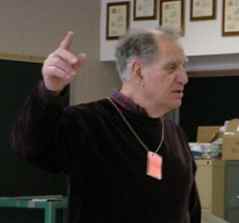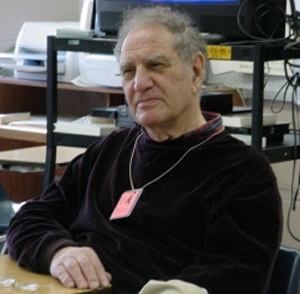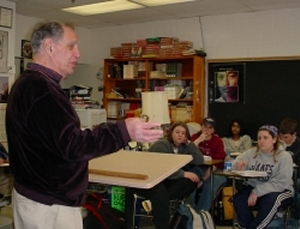Interview
With: Herb Kaplow
ĎThatís What Journalism
is For,
To Present Different
Viewsí
By Kristin Sommers (March 22,
2003)

|
"Journalists look into
issues that involve the public and study them; they get as much information
as possible and then present it to the public. Then they let the representatives
know what the public thinks," said distinguished veteran television journalist
Mr. Herb Kaplow to a class of 15 potential journalists at George Mason
High School recently.
The press is also an important player
in national and international arenas. "If people around the world can see
different news events" Kaplow said, "things can change from that, the world
can be different and thatís caused by journalists."
During his 40 years of broadcasting,
Kaplow covered many historical events and people such as the Civil Rights
Movement and Martin Luther King Jr., the Apollo moon launches, the communist
revolution in Cuba, Richard Nixon and John F. Kennedy, just to name a few. |
Mr. Kaplow talks to the Lasso staff
about
his career as a journalist. |
|
| According to Kaplow,
the most significant event and the one that meant the most to him personally
was the civil rights movement. He worked at NBC during the Supreme Courtís
decision in Brown vs. Board of Education. This decision determined that
separate but equal education for different races was not legal. Following
this decision, Kaplow and his fellow reporters went to Alabama to follow
the Freedom Riders. Often the journalists were the first people to reach
the scheduled stops along the way. Thus, the first people attacked by those
who disagreed with the Courtís decision and the Freedom Riders sometimes
were journalists covering the story because the attackers wanted no record
of the events that would follow. |
 |
| After talking to the class, Mr.
Kaplow sat back and listened to the class talk. |
During a stop at Birmingham, for
example, attackers went after Kaplow and his camera crew. After the attack
Kaplow and his crew quickly went back to the scene to see if their film
was exposed and, unfortunately, it was and all the film was ruined. However,
in a later broadcast, Kaplow used the damaged film canister as a prop to
show his viewers why they had no film that evening. |
 |
Asked to discuss the
most significant changes in journalism that he has witnessed over his long
career, Kaplow said, "The biggest change has been in technology. Now news
can move much faster and can reach further lengths. But these advances
arenít always good. Today news has gone down in editorial content and up
in entertainment value. Because everyone is trying to beat out each other
itís now more about entertaining the public and less about informing them."
Kaplow also showed the class some
important pictures of himself during his career. One was of him with Martin
Luther King Jr., another was of him listening to a briefing by President
Lydon B Johnson while he was covering the White House. A third photo showed
him by a presidential motorcade as President Nixon was climbing in his
car. |
| The journalism class listens intently
to Mr. Kaplow discuss his career and give some valuable advice. |
Kaplow also gave advice to the journalism
class. "Donít major in journalism," said Kaplow. He himself majored in
history and he says that it helped when he was covering certain stories.
When asked why the public often has
a low opinion of journalists, Kaplow said, "People donít like to know that
other people disagree with them. But thatís what journalism is for, to
present different views."
Tell us what you think.
E-mail lassogmhs@hotmail.com
|

